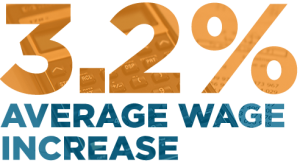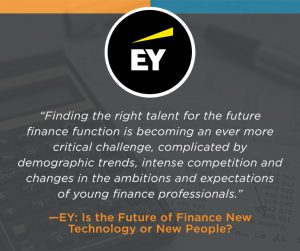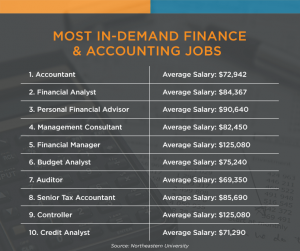You don’t have to be an accountant to do the math: The BLS reports that 5.5 million jobs in America are currently unfilled due to lack of talent. Meanwhile, they project a 10% increase in the number of finance and accounting occupations by 2026. It’s no surprise, then, that employers can expect 2019 to be another year spent struggling to recruit the best people.
This ongoing talent shortage is the underlying theme for many of the recruiting and hiring trends that are top of mind this year. Our aim is to provide you with a comprehensive guide to the finance and accounting labor market to prepare your staffing and recruiting practices for the year ahead.
Contents
- A Quick Glance at the 2019 Labor Market
- A New Focus for the Future of Hiring
- Hiring Insights in Finance & Accounting
- 2019 from the Perspective of Key Leaders
A Glance at the 2019 Labor Market

The national unemployment rate is at a record low since 1969 and is even lower in many industry sectors and regional markets.

This is a typical increase in wages, only 0.1% higher than 2018, which implies stagnant wage growth.
However, job switchers in finance can expect a 9.4% wage increase – a highly attractive reason to seek something new.

25.7% of employees are actively seeking new job opportunities.
And 55.5% are passively open to new job opportunities.
Best cities for jobs
 Glassdoor ranks these cities based on hiring opportunity, cost of living, and overall job satisfaction:
Glassdoor ranks these cities based on hiring opportunity, cost of living, and overall job satisfaction:
- Pittsburgh, PA
- St. Louis, MO
- Indianapolis, IN
- Cincinnati, OH
- Hartford, CT
- Boston, MA
- Memphis, TN
- Raleigh, NC
- Cleveland, OH
- Detroit, MI
Top Perks Employers are Highlighting
- Casual dress codes
- Employee discounts
- Remote work opportunities
- Extra paid time off
- Signing bonuses
- Free lunches
- Gym memberships
- Work from home Fridays
- Daycare
A New Focus for the Future of Hiring
In 2018, AI-powered recruitment technologies took off across every industry. Seeking to automate the application, screening, and interviewing processes, these tools unburden the hands, and minds, of recruiters and corporate talent acquisition professionals everywhere.
However, our stance on this trend has been, and always will be, that humans are greater than machines – most especially in recruiting for highly skilled Technology, Finance, Engineering and Marketing professionals.
Even with a quarter of employees looking for a new job, and over half passively interested should the opportunity present itself, employers cannot rely on the programming of their recruitment technology to make the right matches and entice the best-fit talent. This is the year that employers must focus on the human side of recruitment, specifically, the candidate experience.
Here are a few numbers proving why the candidate experience is critical this year:

68% of employees believe the candidate experience is a reflection of the employee experience

51% of people continue to look for jobs even after they’ve accepted an offer

31% of candidates expect a customized message when a company reaches out with a new opportunity

55% of applicants give up if they haven’t heard back from a company within two weeks
In short, the role of the candidate experience in your recruitment process cannot be overlooked. One in seven new hires accept a job offer only to walk away at the last minute. Do not let this become your story.
Quick steps to an awesome candidate experience
- A fast and easy (and mobile-responsive) application process
- Quick feedback and responses to every candidate
- A compelling employer brand that reflects your company culture
- Personalized emails, phone calls, and messages throughout the process
- A short, but thorough, interview process
- A clear understanding of the benefits and perks you offer
- An efficient and valuable onboarding process
Hiring Insights in Accounting & Finance
The finance field is undergoing a transformation due to trends such as:
- FinTech
- Cryptocurrency
- Blockchain
- Robotic process automation (RPA)
- Cloud
- Artificial Intelligence
- Cybersecurity
- Regulatory changes
But finding the talent to tackle these trends presents a major challenge.

47% of CFOs believe their teams are too shorthanded to meet future industry demands.

57% say that skills in predictive and prescriptive analytics are crucial for finance and accounting functions of the future.
773,800 new jobs will be added to the finance and accounting marketplace by 2026.

2019 from the Perspective of Key Leaders
 “Low unemployment and increasing skills gaps continue to plague employers who are struggling to fill roles at all levels within their organizations,” said Matt Ferguson, CEO of CareerBuilder. “Fifty percent of U.S. employers reported that it is taking them longer to fill jobs today compared to any other period of time — a trend that is ultimately giving job seekers more leverage.”
“Low unemployment and increasing skills gaps continue to plague employers who are struggling to fill roles at all levels within their organizations,” said Matt Ferguson, CEO of CareerBuilder. “Fifty percent of U.S. employers reported that it is taking them longer to fill jobs today compared to any other period of time — a trend that is ultimately giving job seekers more leverage.”
How Are You Overcoming the Finance & Accounting Talent Shortage?
You’re probably gearing up for 2019 hiring, but some of these statistics might be concerning.
For us, these statistics are eye-opening. We’re always looking for new ways to partner with companies to overcome these challenges. Our talent acquisition solutions are one-part relationships, one-part insight, and one-part results. It’s a recipe that works every time, and we’d love to introduce you.

